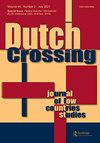Customs and Municipal Law: The Symbolic Authority of the Past (Low Countries, 16th–17th Century)
IF 0.4
3区 历史学
Q1 HISTORY
Dutch Crossing-Journal of Low Countries Studies
Pub Date : 2022-05-04
DOI:10.1080/03096564.2020.1754673
引用次数: 2
Abstract
ABSTRACT Over the past decades, legal historians have become more cautious when it comes to rules that in the Middle Ages and the early modern period were defined as ‘(old) customs’. Earlier optimistic appraisals as to the age of such rules have been challenged. This article argues that efforts of debunking should be combined with a more thorough analysis of the legal consciousness of past societies. It proposes to look at old municipal private law, not as a set of rules fixed by tradition, but rather as a malleable body of norms. The symbolic qualities of law were such that renewal and rephrasal could be combined with an ideology of conservation. It was perfectly possible for administrators to promote new rules as being a part of an ‘age-old law’ of the city or the land, without breaching the implicit conventions as to the qualities of law. However, as will be demonstrated further, there were limits to the agency of administrators in this regard. The codes as to the features of law marked boundaries that had to be taken seriously.习俗和市政法:过去的象征权威(低地国家,16 - 17世纪)
在过去的几十年里,法律史学家对中世纪和近代早期被定义为“(旧)习俗”的规则变得更加谨慎。早先对这些规则存在时间的乐观评价受到了挑战。本文认为,在揭露真相的同时,应该对过去社会的法律意识进行更深入的分析。它建议不要将旧的市政私法视为一套由传统固定的规则,而应将其视为一套可延展的规范。法律的象征性质是这样的,更新和改写可以与保护的意识形态相结合。管理者完全有可能将新规则作为城市或土地的“古老法律”的一部分来推广,而不会违反关于法律质量的隐含惯例。然而,正如将进一步证明的那样,在这方面,行政人员的作用是有限的。关于法律特征的法典标明了必须认真对待的界限。
本文章由计算机程序翻译,如有差异,请以英文原文为准。
求助全文
约1分钟内获得全文
求助全文

 求助内容:
求助内容: 应助结果提醒方式:
应助结果提醒方式:


